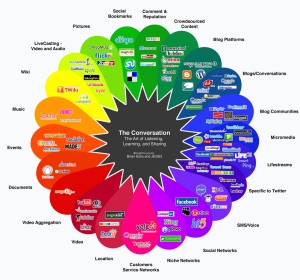Good question right? What’s the simple answer? Maybe not. If you are a marketer thinking about social media marketing then there is a good chance, if you have not done anything yet, that its because you just don’t have enough information yet.
On Monday in Tampa, I attended and spoke at a conference titled Social Fresh, at that conference, during Maggie Fox’s keynote, she nonchalantly asked the audience how many of them were marketers. Surprisingly, more than 80% raised their hands.
Clearly, 2 things became evident: One, there is a need for more social media conferences down in the belly of the state of Florida(that in and of itself is worth another blog post) and two, marketers were indeed starved or looking for answers/solutions to the primary social media marketing puzzle/question. The How To. Implementation. Why haven’t they done it yet?
In this post I want to address those issues so that you can get started with social media marketing.
According to Equation research, one of the primary barriers for social media marketing adoption for brands or agencies is that they just don’t know enough about social media to know where to begin.
But why? Why is it taking this long for marketers, agencies, brands and businesses to learn about social media? For some of us, we have been talking about and writing about social media for almost 4 years. Is it fear of social media? Do we have so much on our plates that we don’t have time to check social media out?
Maybe.
Is it because your falling back on the excuse that you can’t measure social media? Please tell me that’s not the reason. If so, then please have a look at Olivier Blanchard‘s deck on the basics of social media ROI. Once you have rolled through it, I think and hope your fears on the ROI issue can be put to rest.
Another valid reason that may be preventing you from adopting social media may be budgetary. That can certainly affect any and all social media marketing efforts, as well as marketing efforts in general. If you got no money, then you go no money. However, I do want to point out that the barriers for entry into social media are relatively low. In fact your only costs when first starting out will be or could be design and labor.
So know this, getting into “it” is easy. In fact Chris Kieff suggests just listening for the first 6 months before you do anything else. It’s quick to set up and easy to do. I’m not adverse to that strategy, but think that maybe 2-3 months might be just as effective. But the point is, by listening for a bit, that gives you a feel for how things work in social networks and how brands, conversations, posts, links and search results all evolve because of social media.
Managing it takes a little bit more skill. My friend Jason Falls who writes a great blog on all things social media marketing related, has a post on managing social media marketing. Though it’s from 2008, it’s still relevant and valuable even today. There are some great tips contained in the post.
So you might say you don’t have enough time. Hey just like everything else in life, it’s all about time management and being efficient with your usage of time. Social media marketing is no different. I have often said that social media marketing can be an incredible time suck, but the way to work thru that, is to make sure you have a plan every day that applies to your social media marketing strategy and speaks to your social media tactics. Above all stick to it. This includes your personal social media interactions. You have to know how much you allow yourself each day to engage on your own social networks.
Another issue that prevents marketers from even starting and which might be completely out of their hands, is there could be legal constraints. I can tell you from first hand experience how difficult it can be sometimes when any copy or any site designs that you create have to then pass the litmus test of legal. It seemed that everything we did was always not with the customer in mind, but always under the auspices of, “I hope legal is cool with this…”
Beyond that, you may have corporate policies that may prevent your marketing department from engaging in social media, if so, it’s up to you to try and get corporate to look at the bigger picture of social media marketing and its effectiveness. Help them create a social media policy both internally and externally that allows you to use social media in your marketing efforts! Work with them, because there could be a very high likelihood that they have no clue of social media and thus they will err on the side of caution and completely lock down your efforts and attempts at social media marketing.
Lastly, I will say this. Given that search results can return articles and blog posts that rank high on the how to’s of social media and social media marketing, I think it’s important to trust one’s peers and their associated networks. What I’m saying is that if you have questions, go to Twitter and ask a trusted and valued resource. I rely on my network. Rely on yours and get started. it’s not too late.









